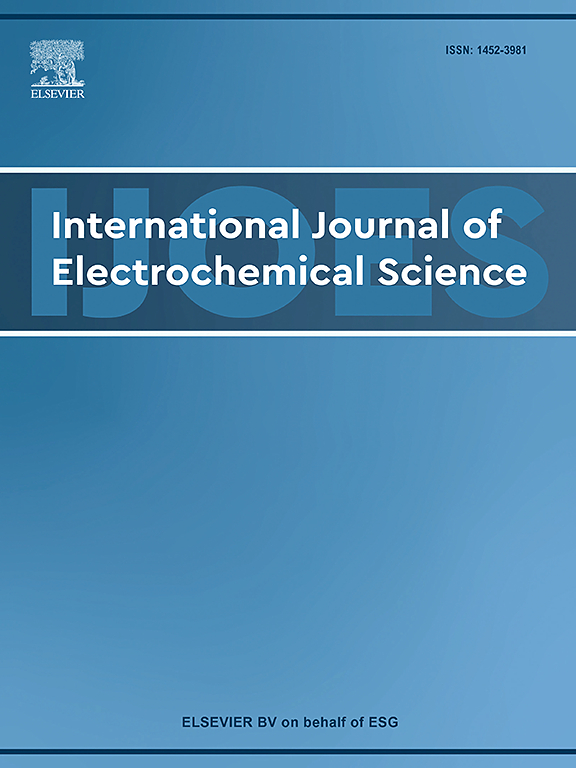Research on State of Charge estimation method for an improved lithium-ion gas-liquid dynamics model with temperature parameters
IF 2.4
4区 化学
Q4 ELECTROCHEMISTRY
International Journal of Electrochemical Science
Pub Date : 2025-05-27
DOI:10.1016/j.ijoes.2025.101073
引用次数: 0
Abstract
Accurate estimation of the State of Charge (SOC) is fundamental to ensure the safe and reliable operation of lithium-ion batteries, and developing a high-performance battery model is crucial for achieving precise SOC estimation. However, current lithium-ion battery models struggle to balance accuracy and complexity. Against this background, on the basis of further investigating battery polarization phenomena and taking temperature effects into account, this paper constructs an improved gas–liquid dynamics model with temperature parameters and proposes an online SOC estimation method based on this model. The model offers good accuracy, and its voltage equation is only first-order, resulting in low computational cost. This model can more perfectly simulate the voltage rebound characteristics exhibited by the battery as a result of polarization reactions and takes into account the influence of temperature on SOC estimation. Compared with the original gas–liquid dynamics model, this enhanced model improves SOC estimation accuracy. Additionally, the unscented Kalman filter algorithm is introduced to achieve online SOC estimation. Finally, a 3Ah ternary lithium battery is tested under three driving cycles to validate the proposed model and algorithm. The results show that the maximum SOC estimation error is less than 2 % in all cases. When facing initial SOC errors and initial temperature errors, the method rapidly eliminates the impact of initial errors, and the influence of initial errors on subsequent SOC estimation results is minimal, demonstrating strong robustness of the proposed algorithm.
含温度参数的改进锂离子气液动力学模型的电荷状态估计方法研究
准确的荷电状态(SOC)估算是保证锂离子电池安全可靠运行的基础,开发高性能电池模型是实现精确荷电状态估算的关键。然而,目前的锂离子电池模型难以平衡准确性和复杂性。在此背景下,在进一步研究电池极化现象并考虑温度效应的基础上,本文构建了一种带有温度参数的改进气液动力学模型,并提出了基于该模型的在线SOC估计方法。该模型精度高,且其电压方程为一阶方程,计算成本低。该模型能较好地模拟电池极化反应产生的电压反弹特性,并考虑温度对荷电状态估计的影响。与原有的气液动力学模型相比,该模型提高了SOC的估计精度。此外,引入无气味卡尔曼滤波算法实现在线SOC估计。最后,对3Ah三元锂电池进行了三次驱动循环测试,验证了所提出的模型和算法。结果表明,在所有情况下,SOC估计的最大误差都小于2 %。当面对初始SOC误差和初始温度误差时,该方法快速消除了初始误差的影响,并且初始误差对后续SOC估计结果的影响很小,表明了该算法具有很强的鲁棒性。
本文章由计算机程序翻译,如有差异,请以英文原文为准。
求助全文
约1分钟内获得全文
求助全文
来源期刊
CiteScore
3.00
自引率
20.00%
发文量
714
审稿时长
2.6 months
期刊介绍:
International Journal of Electrochemical Science is a peer-reviewed, open access journal that publishes original research articles, short communications as well as review articles in all areas of electrochemistry: Scope - Theoretical and Computational Electrochemistry - Processes on Electrodes - Electroanalytical Chemistry and Sensor Science - Corrosion - Electrochemical Energy Conversion and Storage - Electrochemical Engineering - Coatings - Electrochemical Synthesis - Bioelectrochemistry - Molecular Electrochemistry

 求助内容:
求助内容: 应助结果提醒方式:
应助结果提醒方式:


